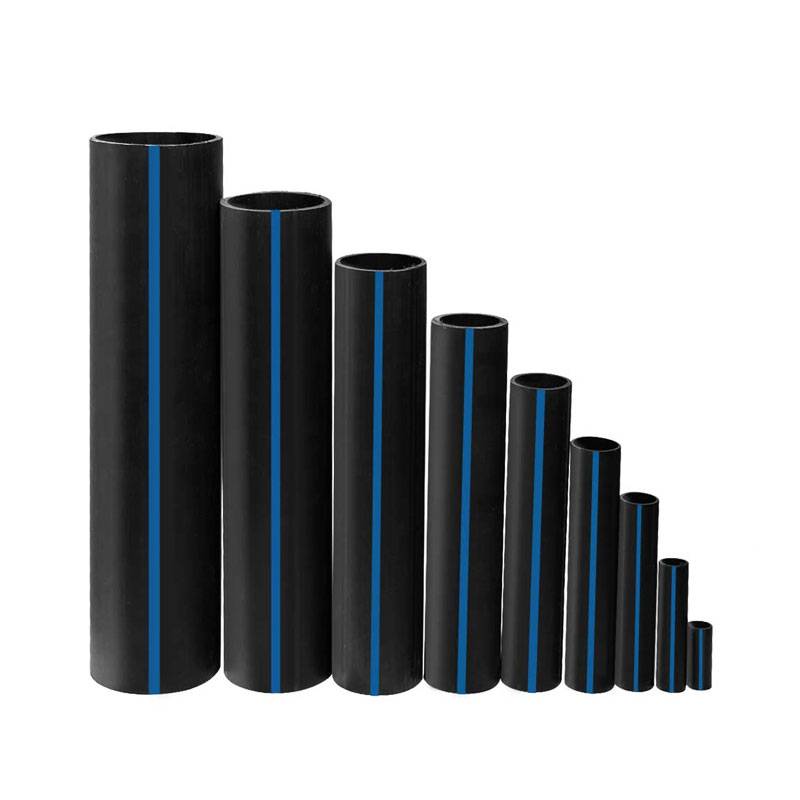Recognizing the Key Advantages of HDPE Pipe for Water and Wastewater Administration
Using HDPE pipe in water and wastewater monitoring provides many benefits that merit factor to consider. Its remarkable toughness and lengthy lifespan make it a favored option for numerous jobs. In addition, the product's resistance to deterioration and chemical damage boosts its integrity in various environments. The advantages prolong beyond just longevity and resistance. hdpe pipe suppliers Midland TX. Exploring its cost-effectiveness and ecological impact reveals much more compelling factors for its widespread adoption in modern-day facilities
Outstanding Resilience and Durability

HDPE pipeline attracts attention for its outstanding toughness and long life, making it a favored selection in water administration systems. Built from high-density polyethylene, these pipelines can hold up against considerable pressure and anxiety, making sure reliable performance with time. Their robust nature allows them to endure severe environmental conditions, including temperature level changes and dirt activities, which can create other materials to stop working.
The lifespan of HDPE pipelines frequently exceeds half a century, offering an economical solution for districts and sectors alike. In addition, the product's lightweight properties simplify installment, minimizing labor prices and timeframes. This sturdiness lessens the need for frequent repair services or replacements, further improving its financial allure.
In water administration applications, the reliability of HDPE pipes implies less interruptions and boosted solution continuity, making them indispensable to lasting facilities development. The combination of sturdiness and long life strengthens HDPE's duty as a keystone in reliable water administration solutions.

Resistance to Corrosion and Chemical Damage
While lots of materials yield to corrosion and chemical damages with time, HDPE pipelines exhibit exceptional resistance, making them optimal for numerous water monitoring applications. This resilience originates from the molecular framework of high-density polyethylene, which is naturally non-reactive and does not rust like steels or deteriorate from direct exposure to severe chemicals. Consequently, HDPE is highly reliable in environments with aggressive compounds, such as wastewater systems that may contain acids, bases, and natural solvents.
Furthermore, HDPE pipelines can withstand environmental factors such as dirt acidity and saline conditions, even more improving their viability for diverse applications (American Plastics HDPE Pipe Manufacturing). Their capacity to preserve architectural honesty with time decreases the threat of leakages and failures, which is important in ensuring the security and reliability of water circulation and wastewater monitoring systems. Subsequently, the resistance to corrosion and chemical damage substantially adds to the overall performance and longevity of HDPE piping services
Cost-Effectiveness and Economic Benefits
When considering the economic implications of water monitoring systems, the cost-effectiveness of HDPE pipes becomes apparent. These pipes offer reduced installation and upkeep costs contrasted to typical products like steel or concrete. Their light-weight nature streamlines transportation and installation, leading to lowered labor expenses. Additionally, HDPE pipelines exhibit a lengthy lifespan, usually exceeding half a century, which equates to less replacements and long-term financial savings.
In addition, the resistance of HDPE to deterioration and chemical damages minimizes the demand for costly repair services and replacements. The pipes additionally support reliable water circulation, reducing energy costs connected with pumping systems. By alleviating leakages and water loss, HDPE pipes add to substantial economic advantages for districts and sectors alike. Generally, the first investment in HDPE piping can yield significant monetary returns over the life expectancy of the water monitoring system, making it a sensible choice for lasting infrastructure growth.
Environmental Sustainability and Lowered Impact

Versatility and Flexibility in Installment
Because of their one-of-a-kind homes, HDPE pipelines use remarkable adaptability and flexibility in installation, making them appropriate for a variety of applications. Their light-weight nature permits for much easier handling and transportation, minimizing labor prices and setup time. HDPE pipelines can be curved and formed to fit various surfaces and project demands, which is particularly advantageous in testing environments.
In addition, their resistance to rust and chemical damage enables installment in diverse setups without the need for specialized safety finishes. The ability to fuse joints creates a continual, leak-free system, boosting the overall honesty and integrity of the installation. HDPE's flexibility additionally accommodates ground motion, minimizing the danger of damages in locations prone to moving soil. Generally, these features make HDPE pipes not just flexible but also a preferred choice for water and wastewater administration systems.
Regularly Asked Concerns
How Does HDPE Pipe Compare to PVC in Water Administration Applications?
HDPE pipe supplies remarkable adaptability, resistance to corrosion, and longevity compared to visit their website PVC. Its lighter weight helps with much easier setup, while its lengthy life-span minimizes substitute expenses, making HDPE a recommended selection in water More hints management applications.
What Is the Life Expectancy of HDPE Water Lines Under Regular Conditions?
Under common conditions, HDPE pipelines can have a life-span ranging from 50 to 100 years. Their longevity and resistance to rust add to their long-lasting efficiency in different applications, making them a reputable selection for infrastructure.
Are HDPE Pipes Recyclable After Their Life Span?
Yes, HDPE pipelines are try this website recyclable after their life span. hdpe pipe in stock Midland TX. They can be processed and repurposed right into brand-new products, considerably minimizing ecological influence and advertising sustainability within the sector, making them an environmentally friendly option for piping options
What Is the Installation Process for HDPE Pipeline?
The installment process for HDPE pipelines includes website prep work, trenching, pipeline blend or mechanical signing up with, backfilling, and stress testing. Correct techniques ensure a long lasting and effective system for delivering water and wastewater properly.
Can HDPE Pipeline Be Utilized for Both Drinkable and Non-Potable Water Equipments?
Yes, HDPE pipes can be utilized for both drinkable and non-potable water supply. Their versatility, sturdiness, and resistance to deterioration make them suitable for numerous applications, ensuring secure and reliable transportation of water in different contexts.